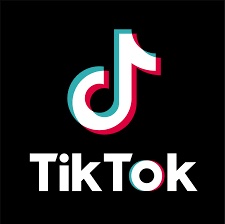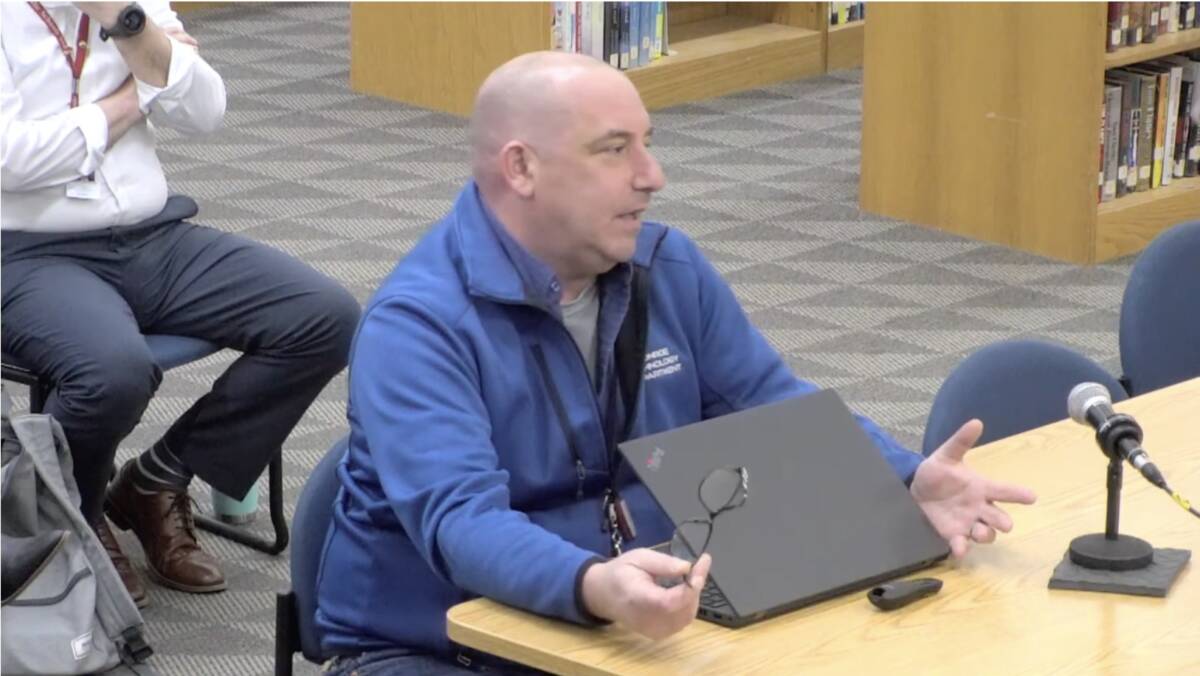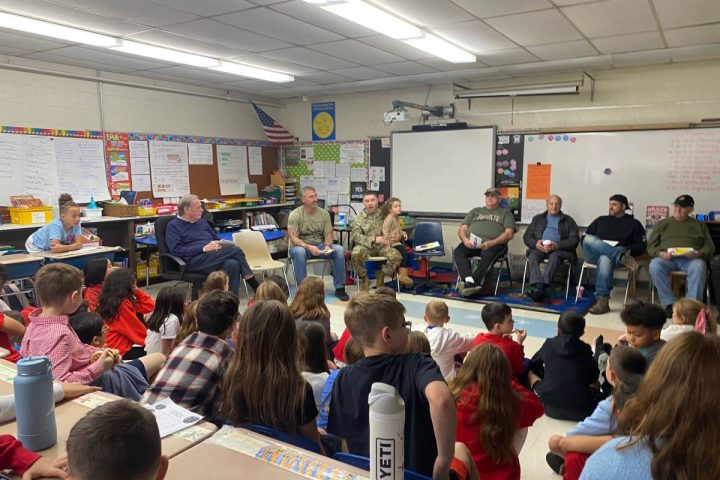MONROE, CT — TikTok is a popular app known for its short videos featuring comedy, social media influencers and cooking recipes among its user-generated content. But it’s also infamous for its TikTok challenges. In one, Superintendent of Schools Joseph Kobza says Monroe students were destroying school bathrooms.
Paul Koorse, director of technology for Monroe Public Schools, told the Board of Education another challenge led to massive spikes in thefts of Hyundai Elantras, but said downloading the app poses problems that are even more insidious.
During a board meeting Monday, Koorse held up his cellphone and said, “if it’s on here, it’s possible that they can be tracking my movements, listening to conversations, accessing my contacts on my phone. Most of the people who are contacts are people I work with, their email addresses and their phone numbers.”
Though Koorse said Facebook and other social media platforms do the same thing, TikTok is based in China, a country hostile toward the United States. This has sparked concerns leading to Congressional hearings over Americans’ personal data ending up in the hands of the Chinese government.
In testimony Koorse called “horrific”, he said TikTok’s CEO told Congress, “we’re committed to moving the data to the United States.”
“Well, they’re committed. They haven’t yet,” Koorse said.
Board of Education Chairman David Ferris, who has been closely following news on the issue, discussed the topic with Kobza and included a discussion on the agenda for the board’s meeting Monday.
“I have concerns over it to the point where I don’t think that it should be on district devices,” Ferris said. “I’m not talking about personal devices, because that’s not our business.”
Ferris proposed blocking the controversial app from district-owned devices — laptops, desktops, tablets, cellphones and Chromebooks — with some exceptions, such as when there is a need to investigate bullying and threats, or for any legitimate educational purposes.
Dr. Alan Vaglivelo, a board member, asked if the district could just block access from its internet connections.
Koorse said TikTok is currently blocked on the district’s networks, via the app and the website. He also said students cannot access it on Chromebooks, which only uses Google applications.
“However, that doesn’t prevent someone from using cellular data to connect,” Koorse said.
Koorse said he would support an outright ban of TikTok on district-owned devices, and told the board the town already banned it for municipal cellphones. He said using the phone app is more dangerous than visiting it on a browser, due to its access to geolocations and contact lists.
During a board discussion on TikTok, Dennis Condon said the social media platform violates the Federal Wiretap Act, adding children, and some members of Congress, do not know the damage it is doing.
“My brother’s in charge of cybersecurity for all the alphabet soup in Washington and he’s like, ‘run fast,'” Condon said of TikTok obtaining users’ personal data. “It’s all being gathered. It’s all going to be used against us, so I’m for eliminating it if we can.”
Jerry Stevens, a fellow board member, asked what other school districts are doing.
“Other districts are handling it pretty much the same way,” Koorse said. “Some are talking about an outright ban. Some cities and town governments at the municipal level, they’re just outright banning it and schools are really discouraging its use.”
“It’s just mind boggling what’s going on with that app,” said Chrissy Martinez, a board member, “and we know parents aren’t monitoring it, so I think to do our due diligence to protect kids is hugely important, so I agree with you,” she added of banning TikTok from district-owned devices.
Martinez said she is concerned over the possibility of someone logging into TikTok on their phone, then logging into PowerSchool and unintentionally allowing TikTok to infiltrate the system, which stores student information.
Ferris said even China, TikTok’s home-country, does not allow children under age 13 to use it, “so what is that telling us?” he asked.
“And other countries have banned it, so we’re not alone,” Condon said.
Vaglivelo said he recently saw a panel discussion with psychologists talking about mental health problems, which they traced back to the rise of social media.
‘A garbage app’
 Stevens recalled his years as a teacher at Jockey Hollow Middle School when most teachers opposed allowing students to bring their cellphones to class for “bring your own technology” to school. But Stevens embraced it.
Stevens recalled his years as a teacher at Jockey Hollow Middle School when most teachers opposed allowing students to bring their cellphones to class for “bring your own technology” to school. But Stevens embraced it.
He said the opposition waned after the principal walked into his classroom and saw his 30 students printing T-shirts off their cellphones.
“But it has no educational value,” Vaglivelo said of TikTok.
“Neither did cellphones at first,” Stevens replied.
Jeff Fulchino, a board member who is a Realtor, said he does a lot of business on his cellphone, specific to social media. “I could see it in a business or marketing class,” he said.
However, the board was told educators can use things similar to social media platforms to teach about practical uses of applications. For example, they’ve used something called “Fakebook.”
Condon asked if banning TikTok would impede the goals of the district’s digital citizen curriculum and was told it would not.
Koorse said they were not talking about the use of technology at school, rather they were talking about “a garbage app.”
‘Those days are over’
Aside from privacy concerns, Fulchino asked Koorse what immediate risks TikTok poses for the district. Koorse spoke of the TikTok challenges and expressed concerns over the rise of AI (artificial intelligence).
“I guess the bottom line is they’re here for school,” Stevens said of students. “They’re not here for social media. They can go home and TikTok all they want.”
Fulchino said he just wondered how the district is going to control it outside of what it’s already doing. He also said blocking it from district-owned devices affected teachers, while he contends students are the ones most at risk.
Martinez said she imagines a high number of students would be affected if TikTok were to be allowed on Chromebooks.
“Yes, hundreds upon hundreds,” Koorse said.
“Here’s the problem,” he said, “you can put a policy out there and Joe you can send a directive to people who have district-owned devices to say, ‘you’re not allowed to have TikTok.’ But there is nothing right now that could prevent a user from installing that client on there, not without an additional platform mobile device management plan. That’s an expensive proposition.”
However, Koorse said the town of Monroe is well into the process of updating its security initiatives, adding the town is pulling back local administrative rights for the devices.
“In the past, someone would be issued a device and we would make them a local administrator of that device, so if they needed to do something, they could do it,” he said. “Those days are over. We can’t do it anymore.”
‘Zero point’
Ferris conceded that staff members’ have freedom of choice when it comes to their own personal devices, adding the school board is looking at what it can control. He said not allowing the app on district-owned devices would also be a statement from the board to staff and students that “this is a dangerous product and this is what we’re doing.”
Ferris wanted to get a consensus on TikTok from the board.
Vaglivelo expressed strong opposition to allowing TikTok to be downloaded at Monroe’s public schools. “There’s no point to it,” he said. “That’s the bottom line. It serves no purpose. It has no educational value. There is zero point to having it.”
Vaglivelo asked Stevens what his position is.
“I support getting rid of it,” Stevens replied.
“Nobody here supports TikTok,” Vaglivelo said, turning toward Koorse, “just do what you have to do.”
All school board members present agreed to block TikTok from district-owned devices.
“We have a consensus,” Ferris said, turning to the superintendent and adding, “Joe, you understand the directive from the board and, with limited exception, we’re taking a stand. We’re trying to keep everybody safe.”
Ferris also expressed faith in Kobza and other administrators to use their discretion.
All respectful comments with the commenter’s first and last name are welcome.









